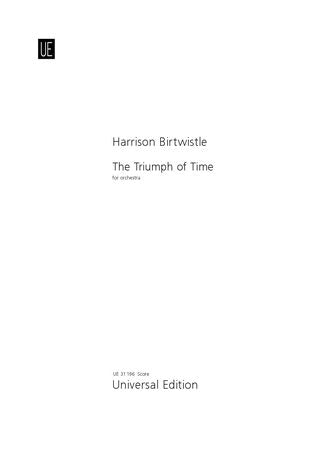
UNIVERSAL EDS/WIENER/PRESSER - 864872
Birtwistle The Triumph of Time Full Score
Composer: Harrison Birtwistle
Publisher: Universal Edition
Format: Full Score
Birtwistle The Triumph of Time Full Score
Juilliard Store
144 West 66th Street
New York NY 10023
United States
Choose options
Birtwistle The Triumph of Time Full Score
Juilliard Store
144 West 66th Street
New York NY 10023
United States
Birtwistle The Triumph of Time Full Score
Juilliard Store
144 West 66th Street
New York NY 10023
United States
Harrison Birtwistle is one of the triumvirate of composers who formed the Manchester Group in the fifties. Peter Maxwell Davies and Alexander Goehr, the other two, were soon to find success outside their immediate sphere, but it has taken Birtwistle much longer. In fact it was not until 1965, when his Tragoedia for ten players was given at Wardour Castle, that he became known to a wider public. Since then his development has been rapid, and The Triumph of Time is one of the most recent fruits of an extremely fertile period. It was commissioned by the Royal Philharmonic Orchestra and first performed by it at a concert in June last year [1972]. Many regard it as one of the most important orchestral scores to have been composed by an Englishman during the last decade or so. Some of his colleagues among the younger generation of composers even regard it as flawless – if music can ever be said to be flawless. Yet Birtwistle doesn't put a foot wrong in it. From every aspect the score ‘works’, and when it is over one is left with the impression of an event that has been powerful, stimulating and totally integrated.
The Triumph of Time is based on an allegorical painting by the sixteenth-century Flemish artist, Pieter Bruegel. Bruegel’s picture shows the figure of Time riding in a cart surrounded by marauding bands of skeletons. The landscape is ravaged and the canvas is covered with manifold images of death. Birtwistle transfers these images to the present. We are invited to watch a slow funeral cortege as it passes us by. As spectators and listeners we are involved and yet uninvolved with the action at one and the same moment. Time is the inescapable mode of our existence and death our ultimate destination: thus we are involved. But there are moments when we can remove ourselves from the inevitability of time, moments when we can stand back from ourselves, moments when we can observe events with passive objectivity. The funeral cortege may be symbolic and activate our empathy or horror, but it may also be an event moving towards us and past us at a speed which allows us to contemplate only the gradual metamorphoses of visual planes. In other words, we are the observers of an event in slow motion.
Recently Birtwistle has been fascinated by slow-motion techniques. In La Plage, the work he composed in 1972 immediately after The Triumph of Time, he takes a simple, hauntingly static story by Alain Robbe Grillet and subjects it to the technique of a slow-motion film sequence. The use of slow-motion in the cinema is usually confined to dream sequences. Time is suspended, the real becomes unreal. Such sequences are highly sensuous. Our attention is focused on a movement which does not obey the normal measure of time. We are plunged into a dimension where reason gives way to the magic of the erotic. So in Birtwistle the macabre and the sensuous share the same bed.
Is this the reason why The Triumph of Time is cast as a huge funeral march of Mahlerian proportions? From the very opening, harp lower strings and horns start a momentum that moves extremely slowly and, for the most part, extremely quietly. Gradually the music unfolds towards a shattering climax, behind which the strings hold a widely-spaced chord of hushed stillness. Then the sounds die away and we are left with the hallow noise of a bass-drum roll. The sounds are mostly clusters of tightly knit strings or brass, but from time to time come thrice important ideas that stand out from the rest of the textured. These are a long melody on the cor anglais, a high piercing cry from the soprano saxophone, and a muted fanfare from the trumpets. It is these recurring ideas which give us our bearing in the flux of Birtwistle’s time. They are never the same, they always undergo metamorphoses, but they are the elements which we can grasp and make our own through recognition. Time may have its triumph, but there are moments when we can defy it. Such moments are those contained in a work of art of compulsive beauty.
Michael Hall, 1973
